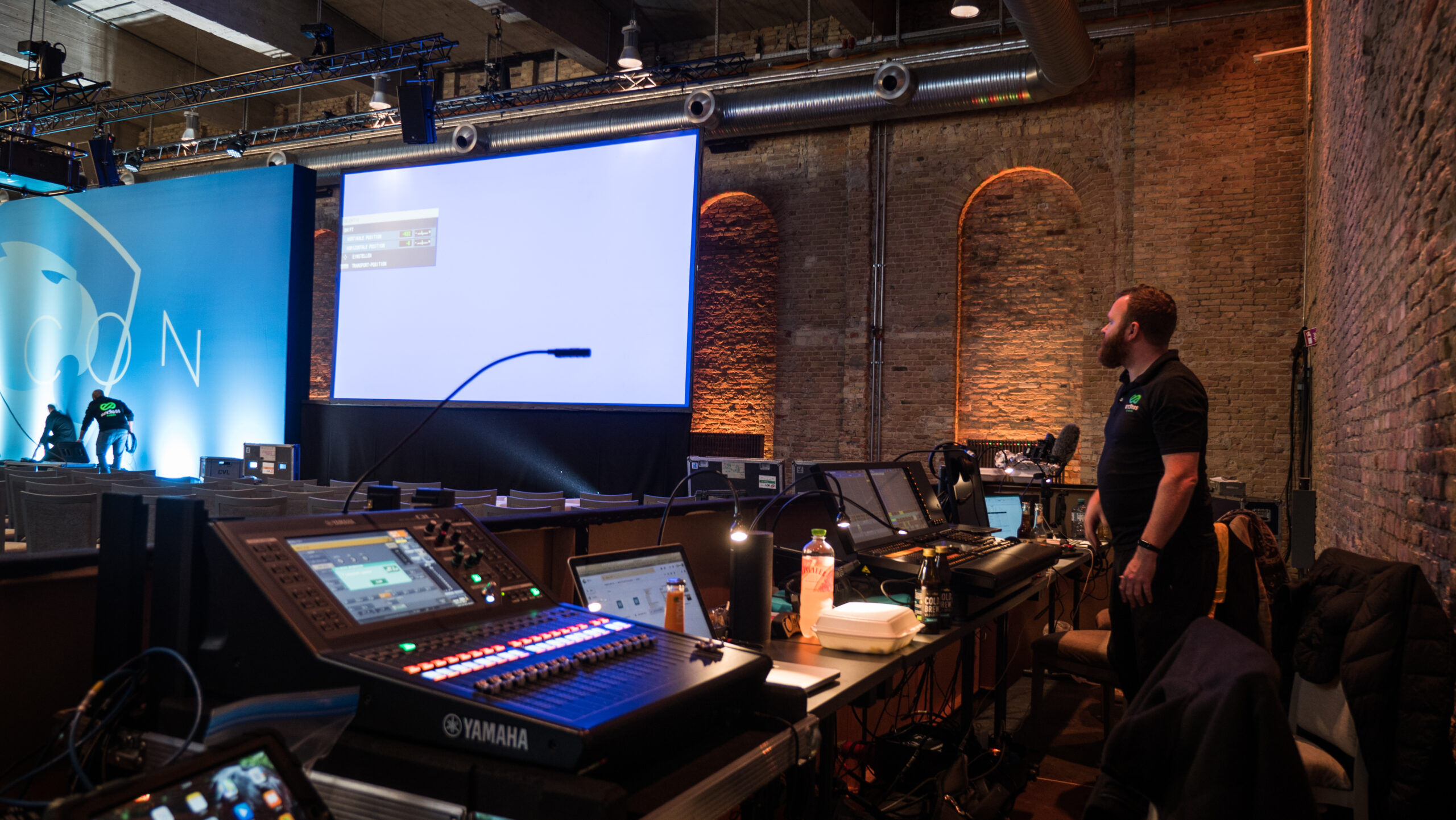Exactly How Event Production Works: A Comprehensive Take A Look At the Process
Event production is a facility and organized procedure that needs careful planning and implementation. It starts with establishing clear goals and recognizing the target audience. Each action, from budgeting to venue selection, plays a crucial role in making certain success. As the procedure unfolds, numerous components need to line up perfectly. Yet, the nuances of this detailed procedure typically go unnoticed. What are the essential phases that add to a memorable event?

The First Preparation Phase
When beginning on event production, mindful preparation is vital to ensure an effective end result. The initial planning stage acts as the structure for all succeeding initiatives. Throughout this phase, event manufacturers need to specify the event's function and objectives clearly. Identifying the target audience assists customize the experience and messaging, guaranteeing significance and engagement.Producers need to likewise think about the event layout, whether it be in-person, digital, or crossbreed, as this will certainly affect different logistical aspects. Selecting a suitable date and place is critical, as it influences access and availability.Furthermore, putting together a trustworthy group is essential for dividing responsibilities and streamlining interaction. Establishing a timeline with milestones assurances all tasks are completed on time. This phase includes complete research study, including recognizing prospective challenges and devising approaches to alleviate risks. Eventually, a well-structured preliminary planning stage sets the tone for an effective event production journey.

Budgeting and Source Allocation
In event production, reliable budgeting and resource appropriation are vital for success - event production charlotte. Developing monetary specifications establishes the foundation for all succeeding choices, while source distribution strategies assure that every component of the event is appropriately sustained. With each other, these elements assist maintain control over expenditures and maximize making use of readily available resources
Establishing Financial Parameters
Developing financial criteria is vital to the success of any type of event production, as it establishes the foundation for effective budgeting and source allowance. This process begins with specifying the total budget, which includes all facets of the event, including venue costs, wedding catering, and marketing. By determining readily available funds, event planners can prioritize expenditures and designate sources accordingly. Furthermore, it is important to carry out thorough marketing research to expect potential prices and identify financing sources, such as sponsorships or ticket sales. Establishing clear economic criteria likewise aids in risk management, allowing coordinators to allot contingency funds for unanticipated expenses. Inevitably, a distinct spending plan works as a roadmap, leading the event production group towards achieving their goals while preserving financial control.
Source Distribution Strategies
Efficient source circulation strategies are necessary for taking full advantage of the effect of an event while adhering to spending plan constraints. Successful event production calls for a careful method to budgeting and source allowance. Planners need to prioritize important components such as place, event catering, and technology, making sure that funds are designated to areas that boost guest experience. A detailed budget should detail anticipated expenses and identify locations for prospective cost financial savings, such as bargaining with vendors or exploring sponsorship possibilities. In addition, tracking expenses throughout the preparation procedure aids stop overspending. By using strategic source circulation, event producers can provide a memorable experience while preserving monetary obligation, inevitably adding to the overall success of the event.
Place Option and Logistics
Selecting the ideal place is necessary to the success of any kind of event, as it sets the phase for the overall experience. Place option includes examining numerous elements, consisting of ability, availability, and place. Coordinators have to take into consideration the target audience and the nature of the event, ensuring the location straightens with the event's goals.Logistics play a significant function in this process, including arrangements for seating, audiovisual tools, and providing services. A well-chosen place needs to facilitate smooth flow for participants and team, enhancing engagement.Additionally, assessing potential locations for amenities like car parking, washrooms, and emergency leaves is essential for safety and security and ease. The timeline for securing the place is likewise critical, as popular places may reserve quickly - event production charlotte. Extensive planning and timely execution can inevitably add to a smooth event experience, making venue choice and logistics essential elements of successful event production.
Imaginative Principle Growth
While the place establishes the physical phase, innovative idea development shapes the event's identity and story. This procedure starts with determining the event's purpose and target audience, permitting event manufacturers to develop a compelling style that resonates with attendees. Conceptualizing sessions usually include diverse perspectives, fostering cutting-edge concepts that line up with the event's goals.Once a theme is developed, visual elements such as color combinations, signs, and decoration are created to improve the overall ambience. Narration techniques might additionally be integrated to create an interesting journey for participants, guaranteeing a remarkable experience. Furthermore, considerations pertaining to enjoyment, activities, and interactive parts are aligned with the picked principle, strengthening the theme throughout the event.Ultimately, efficient creative idea advancement warranties that every facet of the event works cohesively, leaving a long-term impression on participants and satisfying the event's purposes. This foundational job lays the groundwork for subsequent planning and implementation stages.
Working together With Suppliers and Providers
Effective event production hinges on efficient collaboration with vendors and distributors. Selecting trustworthy companions, negotiating contracts properly, and guaranteeing prompt distributions are crucial actions in this procedure. Each of these factors adds significantly to the total success and smooth execution of an occasion.
Selecting Reliable Partners
Just how can event planners ensure a seamless production experience? Choosing trusted companions is essential in accomplishing this objective. Event organizers must conduct extensive study to identify vendors and vendors with a tried and tested record of excellence. This includes checking recommendations, evaluating portfolios, and assessing client comments. Coordinators must focus on partners who demonstrate expertise, prompt interaction, and a willingness to team up. Building strong relationships cultivates depend on and enables fast analytical throughout the event. Furthermore, it is helpful to pick neighborhood suppliers that recognize the place and local logistics. Inevitably, an effective event depends upon the synergy between planners and their partners, ensuring that every element of production runs smoothly and effectively.
Working Out Agreements Successfully
Efficient negotiation of contracts is an important action in the partnership between event coordinators and their vendors and distributors. This procedure includes clear communication of expectations, deliverables, and timelines. Organizers need to conduct extensive research study on market rates and market criteria to develop a baseline for settlements. It is crucial to develop a collaborative environment, motivating open dialogue concerning terms, pricing, and possible contingencies. Planners ought to also focus on recognizing the supplier's capacities and constraints to align their requirements successfully. Adaptability can lead to mutually advantageous contracts, fostering long-lasting partnerships. Crafting distinct agreements that include certain performance metrics can help assure accountability, inevitably resulting in effective event hop over to here execution and complete satisfaction for all parties included.
Guaranteeing Timely Shipments
Timely shipments are necessary for the smooth implementation of any kind of event, needing persistent partnership between organizers and their vendors and vendors. Reliable interaction is essential, as it assists develop clear assumptions concerning shipment timetables, amounts, and specific demands. Planners often create thorough timelines to lay out vital milestones, guaranteeing all events continue to be straightened throughout the process. Regular check-ins with suppliers can help determine potential delays early, permitting positive services. Additionally, building strong connections with trusted suppliers promotes count on and accountability, which can lead to far better solution and prioritization. By prioritizing these joint initiatives, organizers can reduce disturbances, therefore enhancing the overall efficiency of event production and guaranteeing that all necessary products and solutions show up as intended.
Advertising and Promo Techniques
While arranging an occasion, the success of marketing and promotion techniques can significantly affect presence and interaction. Reliable methods commonly include a mix of electronic advertising and marketing, traditional marketing, and grassroots outreach. Making use of social explanation media platforms enables real-time communication and targeted advertising, getting to certain demographics efficiently. Email advertising projects can further engage possible attendees with individualized material and reminders.Collaborations with influencers or sector leaders can likewise boost reliability and expand reach. Developing appealing web content, such as video clips or blogs, assists to produce buzz and endure interest leading up to the event. In addition, leveraging early-bird discounts and unique benefits can incentivize ticket purchases.Promoting with typical channels, such as posters or local media, remains relevant, especially in community-focused occasions. A comprehensive strategy that incorporates several methods assurances maximum visibility and involvement, inevitably adding to the event's success and the creation of an unforgettable experience for participants.
On-Site Implementation and Administration
On-site implementation and administration are necessary components that establish the general success of an event. Efficient control throughout the event ensures that all components align with the intended agenda. Event managers manage logistics, consisting of vendor coordination, tools configuration, and guest services. Keeping track of timelines and resolving any type of unexpected concerns are essential for preserving a smooth experience.The staff plays a considerable role, as trained personnel are liable for various tasks such as registration, information dissemination, and technical assistance. Interaction amongst employee is imperative; it cultivates a collaborative environment and allows quick resolution of challenges.Additionally, safety protocols should be complied with, safeguarding the health of all guests. Post-event analyses are additionally component of on-site administration, offering insights for future enhancements. By concentrating on these aspects, event producers can develop remarkable experiences that satisfy or exceed participant expectations while attaining the event's objectives.
Often Asked Questions
Just how Do I Pick the Right Event Theme?
Choosing the ideal event style involves thinking about the target market, event objective, and venue. Investigating existing trends and gathering input from stakeholders can additionally motivate innovative concepts that resonate and produce a memorable experience.

What Prevail Mistakes in Event Production?
Typical blunders Learn More in event production frequently include insufficient planning, bad communication amongst staff member, budget mismanagement, ignoring to take right into account the target market's requirements, and failing to perform a complete post-event analysis for future renovations.
How Can I Measure Event Success?
To gauge event success, one can assess attendee satisfaction, involvement levels, budget plan adherence, and post-event comments. Secret efficiency indicators, such as ticket sales and social media communications, likewise give beneficial understandings right into total performance.
What Should I Do if It Rains on the Event Day?
In the event of rainfall on the day, the coordinator ought to execute contingency plans, such as safeguarding tents or moving tasks indoors. Communication with guests concerning modifications is necessary to ensure a smooth experience despite climate difficulties.
How Can I Ensure Guest Involvement Throughout the Event?

Comments on “Why logistics matter and how event production charlotte keeps things smooth”